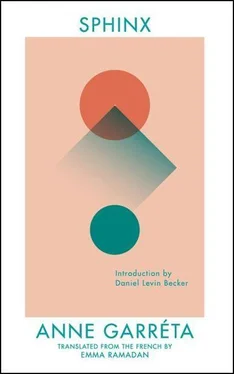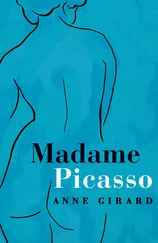Anne Garreta - Sphinx
Здесь есть возможность читать онлайн «Anne Garreta - Sphinx» весь текст электронной книги совершенно бесплатно (целиком полную версию без сокращений). В некоторых случаях можно слушать аудио, скачать через торрент в формате fb2 и присутствует краткое содержание. Год выпуска: 2015, Издательство: Deep Vellum Publishing, Жанр: Современная проза, на английском языке. Описание произведения, (предисловие) а так же отзывы посетителей доступны на портале библиотеки ЛибКат.
- Название:Sphinx
- Автор:
- Издательство:Deep Vellum Publishing
- Жанр:
- Год:2015
- ISBN:нет данных
- Рейтинг книги:3 / 5. Голосов: 1
-
Избранное:Добавить в избранное
- Отзывы:
-
Ваша оценка:
- 60
- 1
- 2
- 3
- 4
- 5
Sphinx: краткое содержание, описание и аннотация
Предлагаем к чтению аннотацию, описание, краткое содержание или предисловие (зависит от того, что написал сам автор книги «Sphinx»). Если вы не нашли необходимую информацию о книге — напишите в комментариях, мы постараемся отыскать её.
is a remarkable linguistic feat and paragon of experimental literature that has never been accomplished before or since in the strictly-gendered French language.
Anne Garréta
Pas un jour Emma Ramadan
Monospace
Sphinx — читать онлайн бесплатно полную книгу (весь текст) целиком
Ниже представлен текст книги, разбитый по страницам. Система сохранения места последней прочитанной страницы, позволяет с удобством читать онлайн бесплатно книгу «Sphinx», без необходимости каждый раз заново искать на чём Вы остановились. Поставьте закладку, и сможете в любой момент перейти на страницу, на которой закончили чтение.
Интервал:
Закладка:
Around two in the afternoon, I got out of bed without having slept, prey to a mixture of despair and exhaustion. Wandering the apartment aimlessly, the shutters closed, I declaimed in an incoherent monologue all that passed through my head for the next two hours. The sound of the telephone, which rang right in the middle of my vociferations, terrified me. I knew who was calling, but I was afraid of answering and betraying my nervousness. Nonetheless, I answered it and managed to control myself for long enough to agree to meet A*** around six o’clock at the Café de Flore.
As soon as we hung up, I hurriedly started getting ready. In the shower, I promised myself twenty times that I would declare my passion that night in no uncertain terms, which I immediately began to assemble and articulate. Looking at myself in the mirror, I swore when I saw the bags under my eyes, which were much worse than usual. Then I wasted a good twenty minutes wondering what clothes to wear on this solemn occasion; I wanted to look my best, which, normally, was the least of my concerns. Look good! Look good! The idea suddenly made me shrug. I observed my naked form displayed in the mirror: was it really that important how I chose to veil my nudity? Since I had lost weight (the mirror confirmed this), my clothes, which I always wore a bit loose, had become rather baggy. I surveyed my wardrobe, still unable to decide what to wear. In a sudden fury to be done with this inner debate on the uselessness of artifice, I grabbed the first pair of pants and the first shirt to fall into my hands. I pulled on my usual leather jacket and left in a rush from the apartment, dreading a late arrival to this decisive rendezvous.

Before A*** brought me there, I had never stepped foot in the Café de Flore. I held a sort of prejudice against this place that stemmed from an old image of the 1950s to which it was for me indissolubly linked. My aversion to this distressing, foul-smelling intellectualism — also known as “existentialism”—was combined with my distrust of these clichéd spaces where public notoriety summons a hybrid species of artists and intellectuals. That they packed together there didn’t imply that the place was in good taste; quite the opposite, their presence foretold an undeniable unpleasantness.
Contrary to the theological idea that if I value the Creator very highly, I can’t admire His creation or honor His creature, when a work of art moved me to the highest point I could only comparatively disparage the author once he or she was relegated to the dismal banality of this café.
To mix with company that derives its life force from the desire to show off is to confine oneself to the enslavement of the ogler; I was disgusted by this pagan and idolatrous Mass, its adepts, its servants, and its totems. And so when I crossed the threshold of this temple for the first time, I wasn’t surrendering to its obscene cult, but to desire alone, and to the deliberate invitation of A*** who, living close by, enjoyed tanning on the terrace in the summer. The perverse effect of A***’s presence was the only thing that made this café tolerable. A***’s tendency to constantly act as if on a stage relegated me to the wings or to the coatroom, which suited me perfectly. As soon as I infiltrated the Flore, I reduced myself to being nothing but a sort of understudy; and only this rather particular statute, which exempted me from the widespread and monstrous fury of recognition, allowed me to show myself without showing off myself.
That evening, without a glance at the audience, I steered myself toward a table tucked to the side where I always insisted on sitting, and where A*** was waiting for me. The proclamations that I had debated nonstop en route crystallized unexpectedly at the sight of A***, and I abruptly broached the subject close to my heart, as if to get it out of the way. A declaration of love is always tedious; it exceeded my patience to dilute the exasperation of my passion in a detailed statement, to represent discursively the unbearable confusion of my immediate desire— tolerating neither delay nor explanation, so much did its urgency torment me. My intentions were clear; my speech only muddled and veiled them in incoherence. I was alternating aimlessly between snippets of narration, the minutes of my interior monologue, syllogisms and images, passing without transition from slang to high style and from the trivial to the abstract, without ever finding the right tone or genre in which to deliver my words. A*** was taken aback by this unprecedented bout of garrulous, confused violence.
A***’s response to the declaration I proved incapable of making was, however, perfectly clear. Its essence could be summarized with a single verdict: “You must not love me”—an attempt to claim that A*** was unworthy of my passion and that it would damage our friendship. A***’s propensity had always been to refrain from passionate attachments of the flesh, attachments that, once broken by misfortune, betrayal, or accident, resulted in prejudicial excesses of sadness. Consequently, A*** thought it wise to disavow the idea of amorous possession, which could do nothing but exacerbate my confusion and forbid us from returning thereafter to that honest friendship, that guarantee of stability, to which we would be better off confining ourselves.
That response, the arguments used to justify A***’s refusal, were attempts to disorient me; in fact they did nothing but accentuate even more the imperative violence of my desire. They also left room for debate. All of the notions of love A***’s reasoning invoked seemed erroneous to me, and I set about proving it. Those reasons were only a pretext; I wanted the truth. I was ranting, using cunning to obtain it, and seeing that the facts were being concealed from me, I brazenly concluded that they must have been in my favor. We spent the night discussing, disputing the erroneous fables used to justify A***’s refusal, and the valid reasons for my desire. Through every tone I modulated the absolute demand and legitimacy of my passion.
In return, A*** took refuge behind a moderation far from the habitual impulsiveness to which I was accustomed. That night the inversion was complete: I made myself into a demon, and A*** symmetrically put on the mask of the angel that I had abandoned. A***’s final argument, pronounced on the threshold of the Eden, was of this order: “I rely on your friendship, and a physical relationship would annihilate it irremediably; so you must not love me, for such a relationship would be hellish. Don’t ask of me what I’m unable to give you without the risk of letting you down.” I relate neither the exact terms of this plea — they were much more trivial — nor the precise progression of A***’s personal logic, which was much less clearly defined. And I cannot relate them simply because A*** never formulated a link between successive sentences. From an unorganized mass of statements, of partial notes and arguments, I managed to extract a line of reasoning, a collection of synthetic propositions that I subsequently reiterated to verify their accuracy. For example, the following assertions emitted more than an hour apart: “If I agree to sleep with you, things won’t be the same afterward;” and, “I’m ill-tempered, no one tolerates me for long;” and, “We can’t sleep together, we’ll end up fighting because neither of us will want to let the other take the lead.” I concluded implicitly that A***, only able to imagine love as a system of power relations, could only envisage our relationship as a battle, leading irremediably to a violent rupture. I had to translate and arrange every word so that they became intelligible to me. Add to this some misunderstandings stemming from different mother tongues, and perhaps one can grasp the difficulty of my enterprise.
Читать дальшеИнтервал:
Закладка:
Похожие книги на «Sphinx»
Представляем Вашему вниманию похожие книги на «Sphinx» списком для выбора. Мы отобрали схожую по названию и смыслу литературу в надежде предоставить читателям больше вариантов отыскать новые, интересные, ещё непрочитанные произведения.
Обсуждение, отзывы о книге «Sphinx» и просто собственные мнения читателей. Оставьте ваши комментарии, напишите, что Вы думаете о произведении, его смысле или главных героях. Укажите что конкретно понравилось, а что нет, и почему Вы так считаете.












